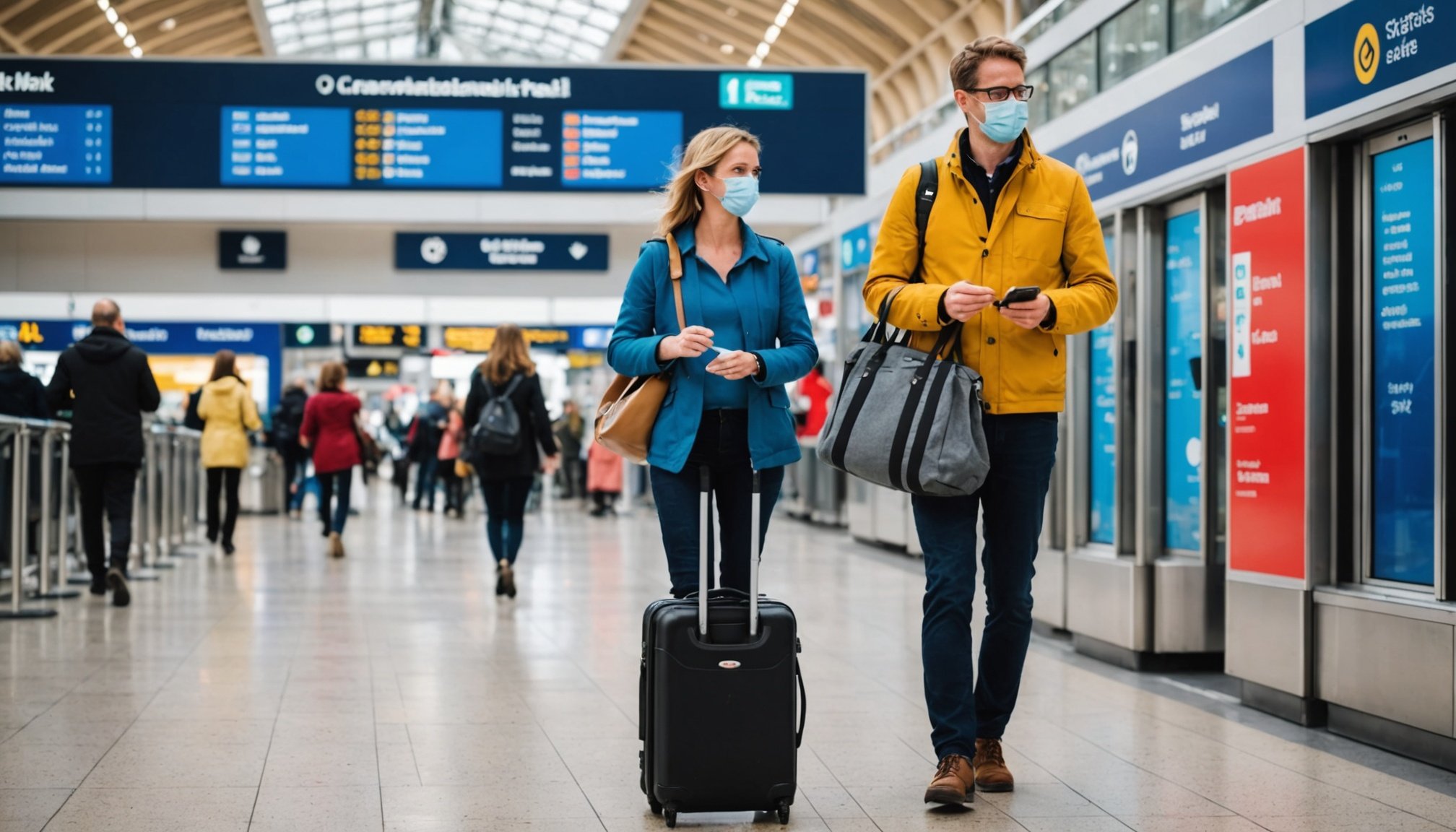Navigating International Travel in Your Third Trimester: A Guide to UK Guidelines
Understanding the Risks and Precautions
When you’re in your third trimester of pregnancy, traveling, especially internationally, can be a complex and cautious endeavor. It’s crucial to understand the risks involved and the precautions you need to take to ensure a safe and healthy journey for both you and your baby.
Health Risks Associated with Travel
Traveling during the third trimester poses several health risks that pregnant women need to be aware of. Here are some key concerns:
Also to discover : Essential Guide for Expecting UK Parents: Choosing the Perfect Pediatrician Before Your Baby Arrives
- Complications Related to Pregnancy: The third trimester is a critical period where complications such as preterm labor, hypertension, and other pregnancy-related issues can arise. Being far from your regular healthcare provider can exacerbate these risks[5].
- Infectious Diseases: Depending on your destination, you may be exposed to infectious diseases such as Zika virus, malaria, and dengue fever, which can have severe consequences for pregnant women and their unborn babies[1][3].
- Air Travel: Flying itself can pose risks, including blood clots and dehydration, which are more significant during pregnancy. Additionally, the stress of travel can sometimes trigger labor[5].
Consulting Your Doctor
Before embarking on any travel, it is essential to consult your doctor or midwife. They will assess your health and the health of your baby to determine if travel is safe for you.
“If you’re pregnant, getting a travel insurance policy shouldn’t be any harder than it was before you were expecting. However, some insurers may impose their own limits and restrictions. So, make sure you read the policy details carefully!” – Confused.com[5].
Also read : Navigating Prenatal Depression: Insights from UK Obstetricians on Care and Support
Your healthcare provider will also advise on any necessary vaccinations, medications, and precautions specific to your destination.
Pre-Travel Preparations
Medical Clearance and Certificates
Many airlines require a medical certificate for pregnant women, especially if you are close to your due date. This certificate, often referred to as a “fit to fly” certificate, is usually required if you are beyond 28 weeks of pregnancy.
| Weeks of Pregnancy | Airline Requirements |
|---|---|
| Up to 28 weeks | Generally no restrictions |
| 28-36 weeks | Medical certificate may be required |
| Beyond 36 weeks | Travel often restricted or requires special clearance |
This certificate ensures that you are fit for air travel and reduces the risk of complications during the flight.
Travel Insurance
Having comprehensive travel insurance is vital when traveling during pregnancy. This insurance should cover medical treatment, emergency repatriation, and travel cancellations due to pregnancy-related complications.
“Medical treatment cover in case you become unwell or injured during your holiday. This includes unexpectedly giving birth while abroad and any associated medical care.” – Confused.com[5].
Here is a detailed list of what your travel insurance should cover:
- Medical Treatment: Coverage for any medical treatment you may need, including hospital stays and emergency surgeries.
- Emergency Repatriation: Coverage for emergency flights back to the UK if you need further medical treatment at home.
- Travel Cancellation: Coverage if you can’t travel due to unexpected pregnancy complications.
- Baggage Cover: Protection against loss or damage to your luggage.
- Travel Disruption: Coverage for any disruptions to your travel plans.
- Third Party Liability: Coverage in case you injure somebody else or damage their property.
- Trip Extensions: Coverage for expenses associated with extending your trip if you give birth while abroad.
Choosing Your Destination Wisely
Health Risks at Your Destination
Different destinations pose different health risks. For example, traveling to countries with high risks of infectious diseases like malaria, dengue fever, or Zika virus can be particularly hazardous for pregnant women.
“Check the latest vaccine recommendations for your destination and see what health risks you’ll face, including schistosomiasis, Zika virus, malaria, and dengue.” – GOV.UK[1].
Here are some tips for choosing a safe destination:
- Research Health Risks: Understand the health risks associated with your destination.
- Vaccinations and Medications: Ensure you have all the necessary vaccinations and medications before traveling.
- Healthcare Availability: Check if your destination has adequate healthcare facilities that can cater to your needs.
Safe Travel Practices
Air Travel Tips
Flying during the third trimester requires some special considerations:
- Stay Hydrated: Drink plenty of water to avoid dehydration.
- Move Regularly: Get up and move around the cabin periodically to reduce the risk of blood clots.
- Comfortable Seating: Choose a comfortable seat with adequate legroom.
- Avoid Tight Clothing: Wear loose, comfortable clothing to reduce pressure on your body.
General Health Tips
Here are some general health tips to keep in mind while traveling:
- Food and Water Safety: Ensure you eat safe food and drink clean water to avoid gastrointestinal infections.
- Avoid Insect Bites: Use insect repellents and wear protective clothing to avoid mosquito bites, especially in areas with Zika virus or malaria.
- Hand Hygiene: Maintain good hand hygiene by washing your hands regularly.
Managing Health Emergencies
Emergency Medical Services
It’s crucial to know how to access healthcare at your destination. Here are some steps to follow in case of a medical emergency:
- Contact Your Insurance: Inform your travel insurance provider immediately if you need medical treatment.
- Local Medical Facilities: Know the location of local hospitals and medical facilities that can provide the care you need.
- Emergency Numbers: Keep the local emergency numbers handy, such as 112 in Nigeria[1].
Mental Health and Travel
Travel and Mental Health
Traveling can be stressful, and this stress can be amplified during pregnancy. Here are some tips to manage your mental health while traveling:
- Stay Connected: Keep in touch with family and friends back home to maintain emotional support.
- Follow Routine: Try to maintain your routine as much as possible, including regular sleep patterns and healthy eating.
- Seek Advice: If you have any concerns about your mental health, seek advice from your healthcare provider or a mental health professional[1].
Traveling during the third trimester of pregnancy requires careful planning, thorough research, and adherence to specific guidelines. By understanding the risks, preparing adequately, choosing safe destinations, and following safe travel practices, you can ensure a safe and enjoyable journey.
Remember, always consult your doctor or midwife before traveling, and make sure you have comprehensive travel insurance that covers all potential risks. With the right precautions and knowledge, you can navigate international travel confidently and safely.
Final Checklist
Before you embark on your journey, here is a final checklist to ensure you are well-prepared:
- Consult Your Doctor: Get a medical clearance and fit to fly certificate.
- Travel Insurance: Ensure you have comprehensive travel insurance.
- Research Destination: Understand the health risks and healthcare availability at your destination.
- Vaccinations and Medications: Get all necessary vaccinations and medications.
- Safe Travel Practices: Follow tips for safe air travel and general health practices.
- Emergency Preparedness: Know how to access healthcare and keep emergency numbers handy.
By following these guidelines, you can enjoy your travel while keeping you and your baby safe and healthy.











